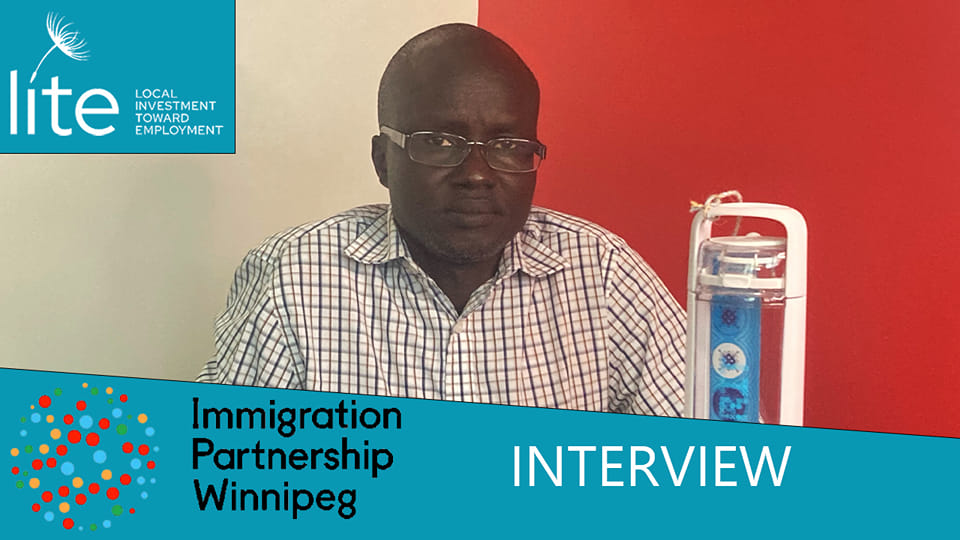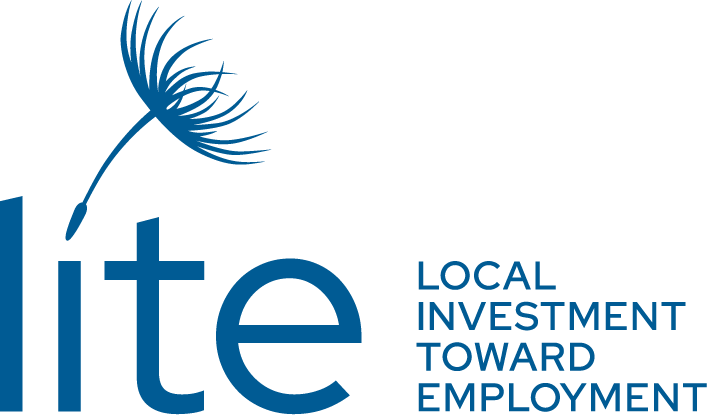
Immigration Partnership Winnipeg is a Local Immigration Partnership here in Winnipeg. Immigration Partnerships are organizations that engage a local community to come together to provide support for immigrants, and create a more welcoming and safe environment for newcomers. They do this by putting newcomers in contact with services to help them settle, like employment, health, and housing services, while also mobilizing local residents to become more welcoming and to combat negative biases towards newcomers.
In this interview, we talk with Reuben Garang, the director at Immigration Partnership Winnipeg. We discuss some of the things that Immigration Partnership Winnipeg does, such as their work in combating racism and biases, as well as improving indigenous-Newcomer relationships. We also discuss our partnership together on the Spirit of Community water bottles, and how they will support them.
To learn more about Immigration Partnership Winnipeg, check out their website: https://www.ipwinnipeg.org/
Full transcript of our conversation with Reuben Garang is below.
Reuben: I am Reuben Garang, the director of immigration partnership Winnipeg.
LITE: So can you tell us what immigration partnership Winnipeg does?
Reuben: Immigration partnership Winnipeg is an indirect service agency. And so what we do is that we work with partners, we bring the right people to the table to solve issues that arise, issues that are related to settlement and integrations. We work with different levels of the government to ensure that people that have chosen Winnipeg as home are supported, and policies are put in place to support them. They also work to build a relationship between newcomers and indigenous peoples here in Winnipeg, and our work is not limited to one thing, we do things that matter to people and address them as partners and bring them to the table. And the way we do that, as I mentioned earlier, is make sure that the right people are on the table to solve issues as they arrive.
LITE: Alright, so how did you get involved with IPW?
Reuben: So I got started with immigration partnership Winnipeg in 2017. Before then, I was working for the Province of Manitoba. So I started there, because it is an organization that does part of the work that I was doing before, and that is to support people that are new to the country, but more importantly, to work on policies that will address issues of concern in our society.
LITE: Is IPW facing any challenges?
Reuben: Of course, yes. In terms of facing challenges, any organization that works with a community always faces challenges, not just talking about the funding issues to carry out activities, but dealing with issues that arise in a community that matters to people. Sometimes, you don’t succeed all the time, by trying to address those issues. So sometimes they leave you with that kind of feeling. So it’s complex work that we do, and sometimes we encounter those challenges.
LITE: I noticed on your website that there’s a lot of talk about anti racism and fighting racism, can you expand upon what IPW is doing to push that?
Reuben: Yes, on top of what I mentioned earlier, we also do the Anti-Racism In Sport here in Winnipeg. That is to say that we talk to the right people, we talk to newcomer groups, we talk to people with disabilities, we talk to women, we talk to indigenous peoples, and bring their concern to our partners in the sports world to address concerns that have been raised by the community. So that work has been successful in a sense that we are able to bring the communities together to address these issues on one table. This year, we managed to sign the Manitoba Sport Accord, that is a number of agencies or organizations that work in sports coming together to sign on to some of our principles that we are able to do through our work with the community. And those agencies are signed on to those accords. We also do training about anti racism in sport, we do that in schools, we do it for coaches, and we’re doing it also for community groups that are interested in better training materials.
LITE: Another thing that was brought up on your website was Indigenous and Newcomer relationships. Can you expand on that?
Reuben: I mentioned earlier that we also work to make sure that there is a better relationship between newcomers and indigenous peoples. When people arrive here from wherever they come from for a number of reasons. Some are coming here because they ran away from their country, some because of persecution. So they know little about the indigenous peoples and their history and the impact of that history on the life of the indigenous communities. So, it is incumbent upon settlement agencies and organizations like our organization to make sure that people have a better understanding of the history of indigenous peoples and the impact of that. So for the last few years, we have developed what we call the indigenous orientation toolkits. Those are materials that are written by writers from the indigenous community, painted by elders from the indigenous community. The intention of those materials is to be used by settlement agencies and any other groups that work with newcomers to make sure that the people that arrive here have a better understanding of the history and its impact on indigenous people. And often, we also do community building activities. We organize events that will bring people together. We also sometimes work collaboratively with settlement agencies to give newcomers opportunities to go to cultural sites and also to visit reserves to acquaint themselves with the general background and situations of the indigenous communities.
LITE: Is there anything that most people probably wouldn’t know about IPW that you wish was more known?
Reuben: So, sometimes people don’t know that we are a partnership building organization. Most of our work is making sure that where there are gaps, that the right people are brought together to address those gaps. So if you have, you know, a situation that you are thinking of tackling, and you wanted to make sure that you are brought on the into the circle, you can reach out to us, we’ll be able to connect you with the right people that can support you to do what you’re planning to do to address gaps in the lives of the people in our community or city.
LITE: So, IPW and LITE have partnered together for the Spirit of Community water bottles, and part of the proceeds of the water bottles will go directly towards IPW. How will those funds be used?
Reuben: IPW, like I mentioned earlier, we are indirect services. So, our main funding comes from the IRCC, and that is very much funding our work, but not so much in terms of the activities that we do in the community. So, for example, sometimes we organize trainings and we have elders come to the training to offer training. We have to give them tobacco, we have to give them honorariums, for example. We don’t get that money in our package, and it’s the same thing when we bring the indigenous and the newcomer communities together. Cultures where people socialize through sharing food, we don’t have all the funds for that. So, the money that we get will go back to the community in terms of making sure that the people that work with us get on honorariums and also get support. Sometimes we have people that come to us and they don’t have means for their conditions. Though we don’t usually provide those direct services, sometimes we do when we are able to.
LITE: So if people want to support IPW, how would they do so?
Reuben: If people wanted to support IPW, like I mentioned earlier, we’re big on improving settlement and integration for newcomers to make it easier. So if you have any ideas that you think will make that easier, then you come to us and we’ll make sure that we implement those ideas because we are a grassroot organization. We use a kind of a bottom up approach where our actions and decisions are informed by what we hear from the community. So if there is something that you saw in the community that is not working, that you think that needs to be addressed, and you want to be part of the immigration partnership Winnipeg, that is one of the best ways to support us. We haven’t gone out before and asked for donations, because we are hosted by another organization. So we are hosted by a Social Planning Council of Winnipeg. That’s the organization that does our finance. So we haven’t asked for direct donations before on our own as IPW.
LITE: Are there any upcoming events or upcoming programs that you’d like to promote?
Reuben: As we speak, not now. There are quite a number of events that are planned that are going to come before October, for example, one part of the work that we do that I didn’t mention is that we also provide civic education to newcomers. This wouldn’t be in public, but it’s always our plan to involve the newcomers, by raising awareness about the upcoming elections, and also to organize an event where the mayoral candidates come together to talk on issues related to immigration in general. So that’s something you know, on standby in terms of what we’re planning to do. I don’t have the date and the time because there’s groups that plan this, but it’s something that we expect will be done. Just last month, for example, we organized a big event where we brought together 1000 people to welcome newcomers. We call it the Newcomer Welcome Fair and Multiculturalism Celebration. We had, you know, quite a number of people coming together on June 26th. More than 1000 people came and this year we were targeting new arrivals from Ukraine and Afghanistan. We also included other refugees and other immigrants. So this idea started a couple of years ago, and has arrived. Most of these people that sometimes come here don’t have any connections and so we make sure that we organize an event so that they feel welcome in our city. Like I mentioned, we address issues as they arise. So we have that and then the next week we have a big event based on the needs of the community.
LITE: And if people want to contact you, what’s the best way to get in touch with IPW?
Reuben: You know, our contact information is on our website. Reach out to our Rgarang [at] spcw [dot] mb [dot] ca ,That will be my email. You could also reach out to us on our Facebook page or other social media outlets. We are always available to talk to people. Weare using office work now, people are coming to work at the office. Before we kind of had a mix, some working at home, some working at the office. So if you want to chat more with us on any issues relating to settlement and integration or building better relations between Indigenous and newcomer communities, we will always welcome any suggestion in that regard.

